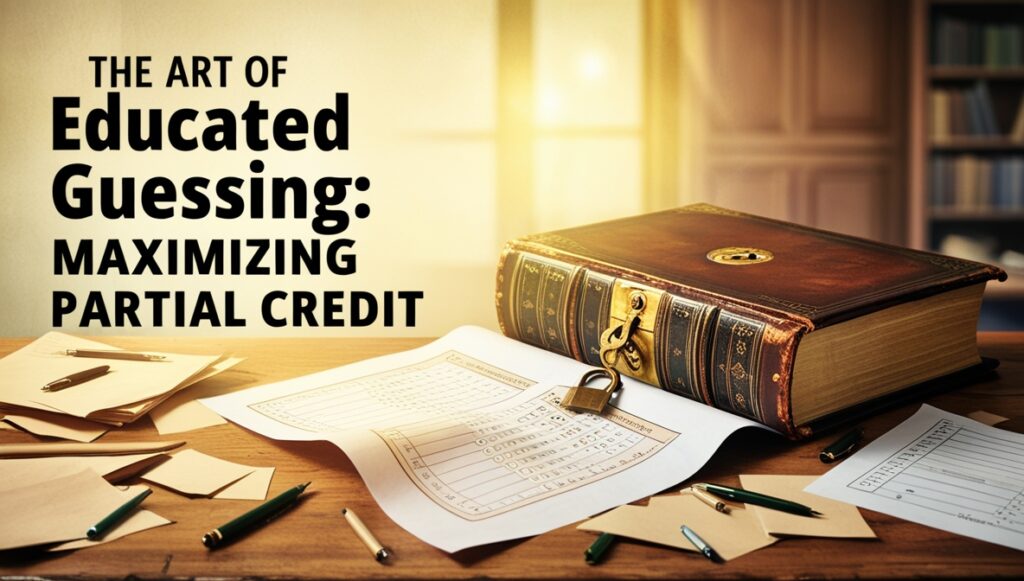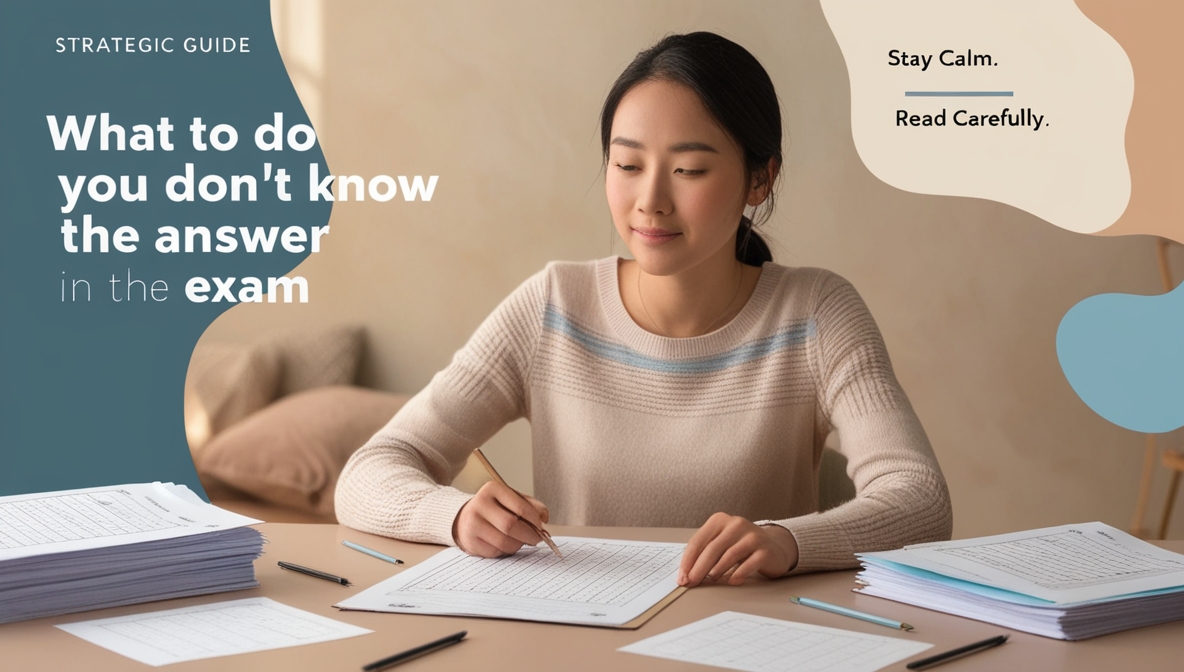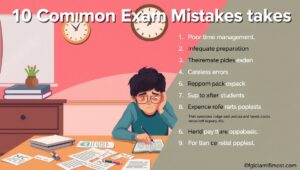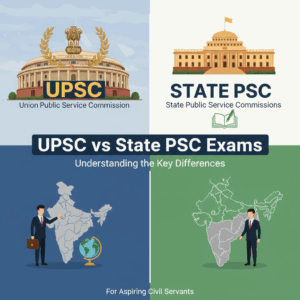It’s every student’s nightmare scenario. You turn the page during an exam, read the question, and your mind goes completely blank. The topic looks vaguely familiar, but the specific answer eludes you. Your heart rate increases, palms start sweating, and panic threatens to derail your entire exam performance. Yet here’s the truth that seasoned test-takers know: encountering questions you can’t immediately answer is normal, expected, and most importantly, manageable. The difference between success and failure often lies not in knowing every answer, but in how you handle the questions you don’t know.

This comprehensive guide explores proven strategies for navigating those challenging moments when the answer isn’t readily available. From psychological techniques to practical approaches, these methods can help you salvage points from seemingly impossible questions and maintain your composure throughout the exam.
Understanding Why Blanking Happens: The Psychology of Exam Amnesia
Before diving into strategies, it’s crucial to understand why your mind sometimes fails you during exams, even with material you’ve studied extensively. This phenomenon, known as retrieval failure or “blanking,” occurs when stress hormones interfere with the neural pathways responsible for memory recall. The amygdala, your brain’s alarm system, floods your system with cortisol and adrenaline when it perceives threat—like a difficult exam question. These chemicals, while useful for physical danger, actually impair the hippocampus’s ability to retrieve stored information.
Understanding this process is empowering because it reveals that blanking doesn’t mean the information is gone—it’s temporarily inaccessible. Like a computer file that won’t open due to a software glitch, the data exists but requires a different approach to access. This knowledge alone can reduce panic, as you realize that with the right techniques, you can often recover seemingly lost information.
The phenomenon is particularly pronounced with information learned through rote memorization rather than deep understanding. When we learn concepts superficially, we create fragile memory traces that break easily under stress. Conversely, information learned through multiple pathways—visual, auditory, and kinesthetic—creates redundant retrieval routes, making it more likely you can access the information even when one pathway is blocked by stress.
The Immediate Response: First 30 Seconds Protocol
When you encounter a question you can’t answer, your actions in the first thirty seconds are critical. This brief window determines whether you’ll recover effectively or spiral into panic. First, take a deliberate breath—inhale for four counts, hold for four, exhale for four. This simple action activates your parasympathetic nervous system, countering the stress response and creating space for clearer thinking.
Next, reread the question slowly, focusing on each word. Often, initial panic causes us to misread or skip crucial information. Look for keywords that might trigger associations: dates, names, concepts, or phrases that connect to your studied material. Sometimes, the question contains hints or context clues that weren’t apparent during your first panicked reading.
If the answer still doesn’t come, make a quick decision: will you attempt this question now or return later? This decision should be based on tactical considerations rather than emotion. If it’s worth significant marks and you have some relevant knowledge, even if incomplete, it may be worth attempting immediately. If it’s lower value or you’re completely blank, mark it clearly and move on. The act of deciding and moving forward prevents paralysis and maintains momentum.
Write down any fragments of information that come to mind, even if they seem unrelated. These fragments often serve as breadcrumbs leading back to the full answer. A student once recalled an entire economic theory by first remembering only that it was named after someone German—that fragment eventually led to remembering Schumpeter, which unlocked the theory of creative destruction. These initial fragments, however small, are valuable starting points.
Mining Your Memory: Advanced Retrieval Techniques
When direct recall fails, sophisticated retrieval techniques can often unlock hidden knowledge. The “context reinstatement” technique involves mentally returning to where and how you learned the material. Visualize the classroom, the textbook page, or the study session where you encountered this information. Sometimes, recreating the learning context triggers associated memories. One student reported remembering a complex chemical formula by visualizing the coffee stain on the textbook page where she’d studied it.
The “alphabetical scan” technique works particularly well for forgotten names or terms. Mentally go through the alphabet, pausing at each letter to see if it triggers recognition. This systematic approach often jolts the correct answer into consciousness. Similarly, the “categorical thinking” method involves listing everything you know about the broader topic, hoping to stumble upon the specific answer through association.
Another powerful technique is “reverse engineering.” If you can’t remember the answer, think about what kind of answer would make logical sense. What would fit the pattern of the subject? What would align with fundamental principles you do remember? Sometimes, working backwards from general principles to specific applications can lead you to the correct answer or at least a reasonable approximation.
The “memory palace walk-through” can be extraordinarily effective if you’ve used this study technique. Mentally walk through your prepared memory palace, checking each room or location for the missing information. Even if you didn’t specifically place this information in your palace, the systematic mental journey often triggers related memories.
The Art of Educated Guessing: Maximizing Partial Credit
When memory retrieval fails completely, the focus shifts to maximizing whatever credit you can earn. This isn’t about random guessing but rather strategic construction of the best possible answer given your limited information. Start by identifying what type of answer the question expects: a definition, an explanation, a comparison, an analysis? Understanding the answer’s required structure helps you craft a response that at least demonstrates proper academic thinking.

For essay questions, create a framework even if you lack specific details. If asked about causes of a historical event you can’t fully recall, you can still discuss general categories of causes—economic, social, political, technological—and make logical inferences about which might apply. Examiners often award marks for demonstrating analytical thinking even when specific facts are incorrect or missing.
In mathematical or scientific problems, show every step of your reasoning, even if you can’t complete the solution. Write out formulas you think might be relevant, identify what variables represent, and explain your approach. Many marking schemes award significant partial credit for methodology. A physics student once received 70% credit on a problem where she couldn’t remember the specific formula but carefully explained what physical principles were involved and how she would approach the solution if she had the formula.
Use related knowledge as scaffolding for your answer. If you can’t remember specific details about Topic A, but you know about related Topic B, explicitly acknowledge the connection and discuss what you do know. Frame it as comparative analysis: “While I cannot recall the specific details of X, it likely shares characteristics with the similar concept of Y, which involves…” This approach demonstrates intellectual flexibility and the ability to synthesize knowledge across topics.
Subject-Specific Strategies for Unknown Answers
Different subjects require different approaches when facing unknown answers. In mathematics and physics, even if you can’t solve a problem completely, you can often score points by demonstrating understanding of relevant concepts. Write down applicable formulas, identify what type of problem it is, sketch relevant diagrams, and explain what each step would accomplish even if you can’t execute it. Set up the problem correctly even if you can’t solve it—this often earns substantial partial credit.
For literature and humanities, when you can’t remember specific quotes or references, focus on thematic analysis and general arguments. Discuss broader patterns, theoretical frameworks, and critical perspectives. Create sophisticated arguments based on general knowledge of the period, genre, or author’s typical concerns. Examiners in these subjects often value original thinking and analytical skill over memorization of specific details.
In sciences requiring factual recall, use your understanding of scientific principles to make educated deductions. If you can’t remember a specific process, think about what would make sense given the laws of chemistry, biology, or physics. Describe what must happen based on fundamental principles. For instance, if you can’t remember the exact steps of cellular respiration, you can still discuss energy transformation, the necessity of breaking down glucose, and the production of ATP based on your understanding of energy conservation.
History and social science questions often allow for broader interpretation when specific facts escape you. Focus on trends, patterns, and causation rather than specific dates or names. Discuss the context and significance of events even if precise details elude you. Frame your answer in terms of historical themes or sociological theories that you do remember, showing how the forgotten specific case likely fits these patterns.
Psychological Management: Maintaining Composure and Momentum
The psychological challenge of not knowing answers extends beyond individual questions—it can trigger a cascade of doubt that undermines your entire exam performance. Developing resilience against this cascade is crucial. Practice self-compassion; remind yourself that no one knows every answer, and exams are designed to challenge even well-prepared students. The goal isn’t perfection but optimizing performance given the circumstances.
When you encounter multiple difficult questions in succession, resist the catastrophic thinking that often follows. Your brain’s pattern-recognition system might interpret this as evidence of total failure, but it’s more likely a cluster of challenging questions or a temporary retrieval difficulty. Take a brief mental reset—close your eyes for ten seconds, consciously relax your shoulders, and remind yourself of questions you’ve already answered successfully.
Maintain what psychologists call “implementation intention”—a predetermined response to challenging situations. Before the exam, decide exactly what you’ll do when facing unknown questions. Having this protocol removes the emotional burden of decision-making under stress. Your implementation intention might be: “When I don’t know an answer, I will spend exactly two minutes attempting retrieval techniques, then either write what I can or move on.”
Use positive self-talk strategically. Instead of “I don’t know this,” reframe as “I’m still retrieving this information” or “I know something related to this.” This linguistic shift maintains a problem-solving mindset rather than triggering a defeat response. Sports psychologists use similar techniques with athletes, knowing that maintained confidence often leads to better performance even in difficult situations.
Time Management When Struggling with Answers
Time becomes especially critical when you’re struggling with answers. The temptation to spend excessive time on difficult questions can derail your entire exam strategy. Implement strict time boxes for unknown questions—allocate time proportional to marks, but no more. If a question is worth 10% of the exam, don’t spend 30% of your time trying to remember the answer.

Use a “triage and return” system. On your first pass through the exam, mark questions with symbols indicating your confidence level and estimated time needed. Questions you absolutely can’t answer get marked for last—if there’s time. Questions where you have partial knowledge get priority for return visits. This system ensures you maximize marks from questions you can answer while leaving room for attempts at difficult ones.
When returning to marked questions, approach them fresh. Sometimes, your subconscious has been working on the problem while you consciously tackled other questions. This “incubation period” often leads to sudden insights. Additionally, information from other questions might trigger memories or provide hints for previously impossible questions.
Be strategic about partial attempts versus complete abandonment. A few sentences demonstrating some relevant knowledge earns more than a blank space, but don’t let partially known questions consume time better spent on questions you can answer fully. The key is finding the sweet spot where time invested yields maximum mark returns.
Learning from the Experience: Post-Exam Growth
How you process the experience of not knowing answers determines whether it becomes a learning opportunity or a confidence destroyer. Immediately after the exam, while memory is fresh, note which topics gave you trouble and why. Was it poor preparation, ineffective study methods, or exam stress? This analysis, done without self-judgment, provides valuable information for improvement.
Recognize that struggling with some questions doesn’t necessarily mean poor performance. Exams often include discriminator questions designed to challenge even top students. If you found certain questions impossible, many others likely did too. Grade curves and scaling often account for universally difficult questions.
Use the experience to refine your study strategies. If retrieval failed for rote-memorized facts, focus on building deeper conceptual understanding in future preparation. If stress caused blanking on material you knew well, incorporate stress management and retrieval practice into your study routine. Every exam where you face unknown questions teaches you about your learning style and stress response, information valuable for lifetime learning.
Consider keeping an “exam journal” documenting which retrieval strategies worked and which didn’t. Over time, you’ll develop a personalized toolkit for handling unknown questions. What triggers memory for you might be different from what works for others—some students find visual techniques helpful, while others respond better to logical reconstruction or alphabetical scanning.
The Bigger Picture: Reframing Exam Performance
It’s essential to understand that exams rarely measure your complete knowledge or potential. They assess your ability to recall and apply information under specific, often artificial conditions. Not knowing some answers doesn’t diminish your understanding of the subject or your intelligence—it simply means that in that particular moment, under those specific conditions, certain information wasn’t accessible.
Many successful professionals report that the skills they developed for handling unknown exam questions—staying calm under pressure, thinking creatively, making educated inferences, and optimizing partial knowledge—proved more valuable in their careers than the specific facts they memorized. The ability to perform when you don’t have all the answers is perhaps the most practical skill education can develop.
Consider that in real-world scenarios, you rarely work in isolation without resources. The ability to recognize what you don’t know, maintain composure, and construct reasonable responses with limited information is highly valuable. Every exam where you successfully navigate unknown questions builds this crucial competency.
Conclusion: Transforming Challenge into Opportunity
Encountering questions you can’t answer during an exam is not a disaster—it’s an opportunity to demonstrate resilience, creativity, and strategic thinking. The techniques outlined here transform these challenging moments from panic-inducing obstacles into manageable situations where you can still earn marks and maintain overall performance.
Remember that your response to not knowing is more important than the not knowing itself. By maintaining composure, systematically attempting retrieval, constructing strategic responses, and managing time effectively, you can often salvage significant credit from seemingly impossible questions. More importantly, you prevent individual difficult questions from undermining your entire exam performance.
The next time you face a question that initially seems impossible, take that deep breath and remember: this is not about perfection but about optimization. Use these strategies to mine whatever knowledge you can access, construct the best possible response given the circumstances, and then move forward with confidence. Every exam is a learning experience, and how you handle the questions you don’t know often teaches you more than the questions you answer easily.
With practice, these techniques become automatic responses rather than conscious efforts. You’ll develop a calm confidence knowing that even when faced with unknown questions, you have a toolkit of strategies to maximize your performance. This confidence itself often improves memory retrieval, creating a positive cycle where effective strategies lead to better performance, which builds confidence, which further improves performance.
The ultimate goal isn’t to know every answer—it’s to optimize your performance regardless of what questions appear on the exam. Master these strategies, and you’ll find that unknown questions become less threatening and more manageable, transforming from sources of panic into opportunities to demonstrate your academic resilience and strategic thinking.



